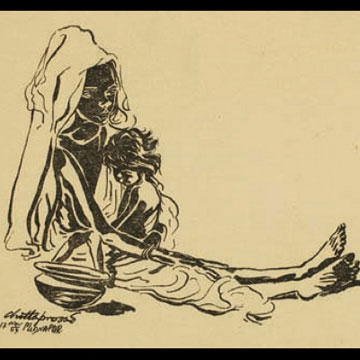 New Delhi:
New Delhi: Of Bengals 60.3 million population at the time, estimates are that between 1.5 and 4 million people died of starvation, malnutrition and disease during the famine of 1943.
A "political artist" of that period covered the famine for several communist publications, and his drawings, on display at the ongoing India Art Fair here, live to narrate the horrors of the time.
Chittaprosad Bhattacharya may not be so well known now -- nor, in fact, during the time that he lived -- but his sharply provocative art reflects the atrocities of the Raj and the horrors of the famine, and led to the publication of "Hungry Bengal".
The result? The authorities were stunned, and suppressed it almost instantly, impounding and destroying copies in large numbers.
Whatever was left did not surface for quite some time, but gained immense significance later as the drawings had that rare mix of fact and art. As these cheaply-made prints were created for the masses rather than an art gallery, they were seldom signed or numbered. With time they took on value as art, and today are prized by collectors.
These dark, black-and-white sketches of pot-bellied children and impoverished families, accompanied by detailed text, is on show in the "Masterpieces of Indian Modern Art" section of the art fair, curated by DAG Modern. Titled "A Record of Hungry Bengal", it provides rare insights into an incalculably monumental tragedy.
"Chittaprosad's drawings produced scathing images of the Bengal Famine -- arresting in their execution, capturing the grimness of the details of this tragic event. The artist trudged on foot from village to village, with his notepad, ink pen and brush, and through his illustrations he captured, with extreme sensitivity, a record through pictures of what the poor were going through," elaborates the text accompanying the drawings.
While some of these drawings and their relevant descriptions (mostly by the artist himself) were being simultaneously published in the communist party's journals during 1943-44, the original sketches now exist as independent pages.
Many of the haunting images show groups of weeping malnourished children. Others are of families, often a mother and her child, lying in bed in anticipation of food or waiting for treatment in some hospital. They are all connected by an underlying theme of despair and horror, difficult to imagine today.
"Many drawings have copious notes on the reverse, or at least the identity of the person, inscribed on (or at the back of) the drawing. A number of these sketches continue his evolved pictorial notation for human figures, while others indicate a tendency towards greater control and preciseness," adds DAG Modern.
Chittaprosad is represented in the National Museum, Prague, The National Gallery of Modern Art, New Delhi, Osians Art Archive, Mumbai, and the Jane and Kito de Boer Collection, Dubai.
It is, of course, a paradox of sorts that the arts space has, for long, been a privilege of the elite. This fair too is visited mostly by the rich and affluent, on the lookout to purchase masterpieces of yesteryears at prices in lakhs and crores.
What do these drawings mean to them, people who have never known hunger or malnutrition? Are they mere objects of superficial beauty to decorate one's drawing rooms or are they, as they should be, reminders of a grim past?
These drawings reaffirm the need to bring the arts to the broader public. No doubt, their material value has helped in the preservation of this rare art; at the same time, they are not mere decorative pieces but also archival treasures of our history.
And not to forget, Chittaprosad created these drawings for the masses, not for collectors.
Until then, if you can afford a ticket to the India Art Fair at the at NSIC grounds in the capital (priced at Rs 499 person/day), do head to the DAG Modern installation where these drawings of a haunting past are on display.
 New Delhi: Of Bengals 60.3 million population at the time, estimates are that between 1.5 and 4 million people died of starvation, malnutrition and disease during the famine of 1943.
New Delhi: Of Bengals 60.3 million population at the time, estimates are that between 1.5 and 4 million people died of starvation, malnutrition and disease during the famine of 1943.